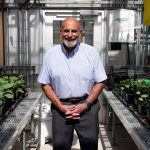Tag Archives University of Saskatchewan

A new vaccine for bovine tuberculosis? Maybe not yet, but a step closer
Canadian research suggests bovine TB vaccine candidate MSX-1 may finally offer some protection without intering with tuberculosis test results, but it’s still early days

University of Saskatchewan launches Introductory Agriculture certificate program

Saskatchewan root researcher honoured by Royal Society of Canada

University of Saskatchewan to receive $3.4 million for beef genomics research facilities

Nutrien donates $15 million to U of S AgBio and Engineering

New uses for pulse starch seen on the horizon
Protein is normally the focus of pulse production, but research shows value can also be gained from the starch byproduct
Researchers at the University of Saskatchewan are seeking new uses for pulse starches in the food and biomaterial sectors. Byproduct market research aims to reduce food waste, increase efficiency and add more value to crops grown on the Prairies. While protein is often the goal for pulse crops in Western Canada, starch makes up more […] Read more
Cost of access to plant gene banks may increase
Proposed changes to international plant gene sharing treaty could could bring additional costs to researchers, farmers
Glacier FarmMedia – Plant breeders around the globe can freely access plant gene banks for development of new crop varieties under the Treaty on Plant Genetic Resources for Food and Agriculture. Proposed changes at the international level could make access — and future crop research — more costly. Who would pay that cost is not […] Read more
Agriculture called unready for border carbon adjustments
Some jurisdictions attempt to ensure imported, domestic products pay the same carbon cost, but food security an issue
REGINA — The world needs far more data if border carbon adjustments are to be implemented and actually work in agriculture, the House of Commons agriculture committee heard last week. Angela Bedard-Haughn, dean of the college of agriculture and bioresources at the University of Saskatchewan, said it’s good that conversations are starting, but it’s also […] Read more
Knowledge can fix regulation

Scientists begin research on gene-edited pigs
Biotech experts say the public is likely willing to eat meat from gene-edited livestock if provided with the proper context
Glacier FarmMedia – Pigs with genes manipulated for disease resistance are in the works. Gene-edited pigs resistant to porcine reproductive and respiratory syndrome (PRRS) could be a commercial reality as soon as 2026 in the United States, but one expert says it’s unclear how Canada’s regulatory system will respond. “Based on the science that they’ve […] Read more




